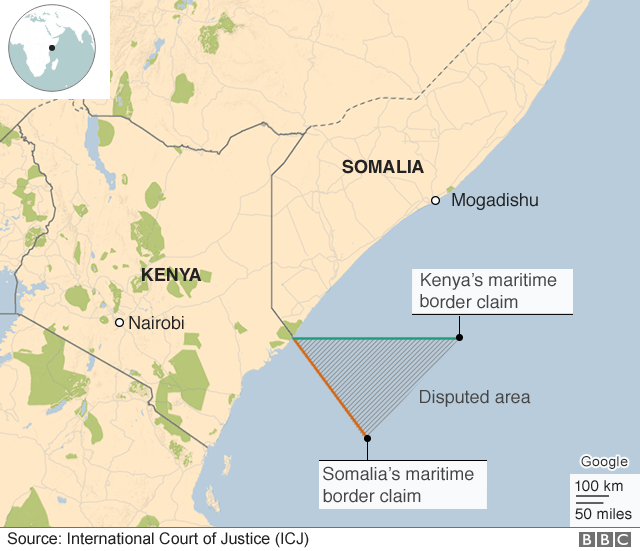The International Court of Justice has awarded Somalia control of most of a potentially oil- and gas-rich chunk of the Indian Ocean after a long legal battle with neighboring Kenya over their sea border. The International Court of Justice (ICJ) ruled on Tuesday that there was “no agreed maritime boundary” and drew a new border close to the one claimed by Somalia, although Kenya kept a part of the 100,000 square-kilometer (39,000-square-mile) area.
The ruling is legally binding, though the court has no enforcement powers.
The court rejected Kenya’s claim of the maritime boundary it sought, saying Kenya had not consistently maintained it. The court also rejected Somalia’s pursuit of reparations after the country alleged that some of Kenya’s maritime activities had violated its sovereignty.
“I thank Allah for … for the fruit of the long struggle made by the Somalis in preventing Kenya’s desire to claim ownership of part of Somalia’s sea,” Somalia’s President Mohamed Abdullahi Mohamed said in a broadcast on his office’s Facebook page. In a speech later on Tuesday, Mohamed urged Kenya to “respect the international rule of law and should instead see the decision of the court as an opportunity to strengthen the relationship of the two countries,” the president, said.
Kenya on the other hand stated that it would not recognise the court’s judgement, alleging that the judicial process had “obvious and inherent bias”.
In a four-page statement issued Tuesday evening, President Kenyatta criticized the decision, firmly stating that Kenya rejects it in totality and would not recognise the court’s findings. “At the outset, Kenya wishes to indicate that it rejects in totality and does not recognize the findings in the decision. The decision embodies a perpetuation of the ICJ’s jurisdictional overreach and raises a fundamental question on the respect of the sovereignty and consent of States to international judicial processes,” said Kenyatta.
The Head of State added that the decision by the World Court will strain relations between Kenya and Somalia. “This decision is, in the circumstances, a zero-sum game, which will strain the relations between the two countries. It will also reverse the social, political and economic gains; and potentially aggravate the peace and security situation in the fragile Horn of Africa Region.”
Kenyatta accused the court of failing to permit the use, let alone the exhaustion, of regional dispute resolution mechanisms, “despite the existence of a robust African Union legal framework on border issues and dispute settlement.”
He said Kenya will pursue the matter through the institutions of the African Union such as the African Union Border Programme and its Peace and Security architecture, in addition to other bilateral arrangements.
The President maintained that he will stand by his oath of office to protect the country’s territorial integrity. “Fellow Kenyans, when I became President on 9th April 2013, I took an oath to protect the territorial integrity of the Republic of Kenya. I do not intend to abrogate my solemn oath; and, I will do everything possible as President and Commander-in-Chief, to preserve the territory of this our great Republic and bequeath the same, intact and unencumbered, to the next President when my term expires in less than a year’s time,”
Questions now centre on what next – and who can enforce the judgement?


